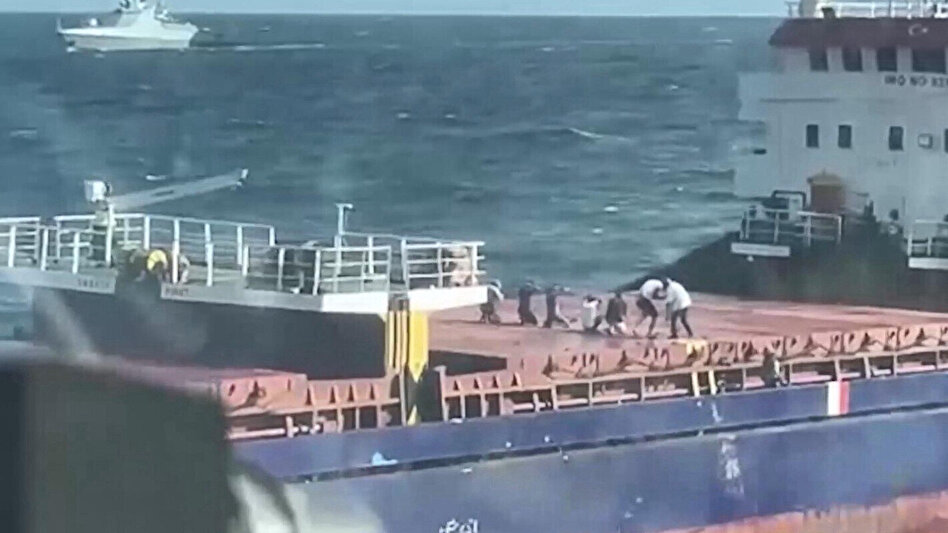

The Turkish public learned of the Russian raid on a Turkish cargo ship from Russian media. The allegations that Türkiye had leased a Libyan port were first covered by Libyan media and then propagated in Greek and Russian media. The migration agreement with the UK and Türkiye was first publicised in British media. Official statements were “no statement”. Is Turkish foreign policy sitting on a fence these days or hedging its bets?
On August 16, Russian media reported that Russian armed marines raided a cargo ship with a Turkish crew and Turkish ownership. In the same week, Turkish citizens learned from the British media that Ankara has signed an immigration agreement with the United Kingdom. And then, as a third stroke, Libyan, Russian, and Greek media reported allegations that Türkiye had leased the Libyan port of Al-Khums for a military base.
The Turkish authorities were just sitting on a fence with their responses to these developments or news.
When Mevlüt Çavuşoğlu was the Foreign Minister, the ministry had a say about every single issue under the sun. After former intelligence chief Hakan Fidan was appointed as the minister, the ministry started not making any statements, even on issues that hold great public interest.
And if the opposition did not bring up the issues, the veiled statements would never be public.
For example, the Ministry of Interior, which is in charge of the migration agreement signed with the UK, made a written statement – without much detail – after main opposition Republican People’s Party (CHP) leader Kemal Kılıçdaroğlu slammed the government with a social media post.
The agreement was aimed at disrupting the supply chain of boats carrying immigrants, with British police officers working in Türkiye. The General Directorate of Security signed the document, but it concerns the Coast Guard Command, which is under the direction of Interior Minister Ali Yerlikaya.
Obviously, they did not want to disclose it in order to avoid conflict, but it was a situation related to Türkiye’s foreign policy, even though the authorization was with the Interior Ministry.
The first official information about the Russian navy’s intvention with the Paulu-flagged Turkish ship sailing to the Ukrainian port and detaining its crew for a while, came in the form of a denial from the Centre for Combating Disinformation under the Presidential Communications Directorate.
It was also after CHP lawmaker Namık Tan’s call for a statement with a post on his social media account.
The Russians had stopped the ship in “international waters,” the statement from the Communication Directorate read. One wondered what would happen if they had stopped the ship in Turkish territorial waters.
Moreover, the statement added that “even though the owner of the ship is Turkish, the ship does not sail under the Turkish flag.” But “the counterparts in the Russian Federation were appropriately warned.”
Had the Foreign Ministry or the Presidency warned “appropriately”? If so, why was no explanation given?
The disinformation centre’s denial also aimed to avoid taking any risk.
On August 15, the Libyan media reported that Türkiye had leased the port of Al-Khums for 99 years and that the Turkish Armed Forces would use it as a base in the Mediterranean. The news was picked up by two Turkish defence industry websites. It was followed by the Russian and Greek media. The Libyan government’s claim that there was no such lease or base was not taken seriously.
According to information obtained by YetkinReport from security sources, the Libyan government had decided on August 5 to move the civilian units in the port, which is used for both civilian and military purposes, to a separate location. However, Libyans who did not want to leave the port wanted to have the decision reversed, with the perception that “Türkiye was coming”. Otherwise, neither Türkiye had made such an application nor was such a lease in question.
Why am I relaying this information to you as “security sources”? Why can’t I cover the news as a statement from the Presidency, the Ministry of Foreign Affairs, or the Ministry of National Defence?
Because, firstly, there is no official statement, and secondly, nobody in Ankara these days wants any conflict to arise in Türkiye’s foreign relations.
At the moment, the spotlight about Türkiye’s foreign relations are not on Hakan Fidan and Yaşar Güler, the Minister of National Defence, nor on Ali Yerlikaya, the Minister of Interior, but on Mehmet Şimşek, the Minister of Treasury and Finance.
Simsek is trying to find money. Could it be because of this that the government is “sitting on a fence” in foreign policy, or may be “hedging their bets” ?
In Turkish politics, the threat of imprisonment has reached CHP leader Özgür Özel. Presidential decrees…
The Cyprus issue has remained stuck in conceptual traps for decades, unable to move beyond…
It is understood that the meeting on June 29 between MİT President İbrahim Kalın and…
After five years, President Recep Tayyip Erdoğan had the opportunity to meet face-to-face again with…
Iranian women have been standing tall for years, not just against the regime, but also…
The U.S. Struck Iran at Israel’s Request. The U.S. launched B-2 heavy bombers from Whiteman…